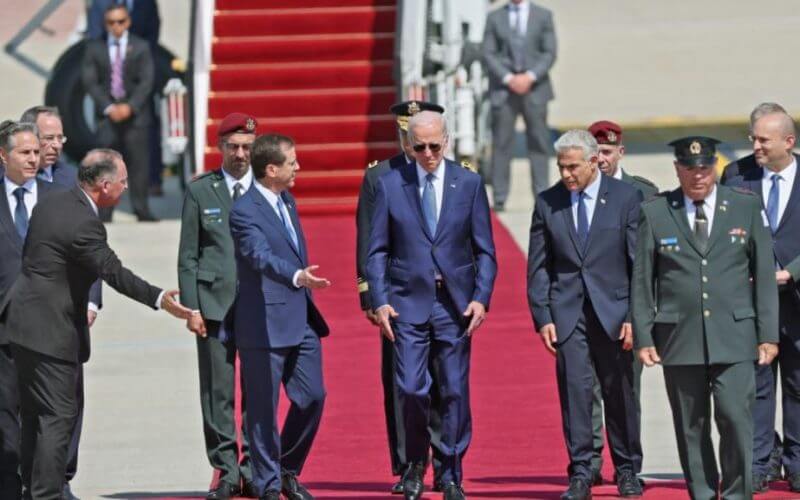1. Meeting Netanyahu
Upon arriving to meet and greet Israeli Prime Minister Yair Lapid and his cabinet officials, President Joe Biden shook hands with Likud Opposition leader and former Israeli Prime Minister Benjamin (Bibi) Netanyahu. While the President's team told reporters that the President would not be shaking hands with anyone at Ben Gurion Airport, the handshake between the two surprised some in the President's national security staff. According to statements from the Likud opposition leader, Netanyahu and Biden have a strong relationship and understand the importance of the security and safety of the Jewish state. The two men have had a history dating back to Biden's time as senator and Netanyahu as an Israeli representative to the United States. During the presidency of Barack Obama, then-Prime Minister Netanyahu did not have strong relations with Joe Biden's former boss, Barack Obama, whom many saw as one of the most anti-Israeli presidents.
2. Strengthen the Abraham Accords
Upon landing in Tel Aviv Wednesday, President Biden announced in remarks to Israeli officials at an arrival ceremony that he would do everything to deepen Israel's relationship with the U.S. and other Arab countries in the region. Many saw this as the President embracing the Trump administration's Abraham Accords, which normalized relations between Israel, the United Arab Emirates (U.A.E.), Bahrain, and several other Arab states. While Biden campaigned against the former president and opposed many of his policies, the embrace of the Abraham Accords reveals one of the biggest successes during the Trump administration that many administration officials have come to acknowledge. As tensions in the Middle East with the Islamic Republic of Iran and Israel continue to increase, the President and his team hope this trip will help strengthen military cooperation between Israel and its allies against Iranian aggression. Sources familiar with the President and his team expect an upcoming announcement from Saudi Arabia, allowing new charter flights for Israel's Muslim minority to the religious site of Mecca.
3. Military Cooperation
After being welcomed by top Israeli officials, President Biden toured an Israeli Defense Ministry display of Israel's sophisticated defense systems at Ben Gurion Airport. The showcase by Israeli Defense Minister Benny Gantz included a long-range Arrow, medium-range David's Sling, short-range Iron Dome, and a new complex interception system known as the Iron Beam. According to reports, the Israeli Defense Ministry is hoping to partner with Washington on the Iron Beam project, hoping for American investment in further developing the new system to match the Iron Dome. The defense minister also provided a classified briefing to the President on the issue of Iran and its military aggression. As Israel continues to face threats from Iranian-backed terrorist groups like Hamas and Hezbollah, the Israeli government has counted on military aid from America and hopes that President Biden's administration will provide them with the necessary equipment to defend themselves.
4. Palestinian Territories
When President Biden and his team announced their trip to the Middle East, the State Department announced the President's intention to travel to the Palestinian territories and meet with Palestinian Authority (P.A.) leader Mahmoud Abbas. The President will visit East Jerusalem and the West Bank city of Bethlehem to meet P.A. officials, with some speculating that the President will discuss the idea of opening a new embassy. Ordinary Palestinians asked by media sources about the President's visit view such actions as nothing and believe that his policies are like his predecessors, favoring Israel over the Palestinian people.
5. Iran's Nuclear Program
Before arriving in Israel with the President, National Security Advisor Jake Sullivan told reporters that the nuclear deal will soon be on the table between Iran and the U.S. While the President repeated his stance for more military cooperation and resources for Israel and its allies, he has signaled his fanatical support for the 2015 nuclear agreement, arguing that it would prevent Iran from acquiring a nuclear weapon. To display the seriousness of America's stance against Iran, the President unveiled and signed a joint agreement with Israeli officials known as the "Jerusalem Declaration," taking a tough stance on Iran's nuclear ambitions. According to reports, Israeli defense officials hope that by meeting with the President, they can air their concerns and change his mind on this issue. Before becoming Prime Minister, Lapid and his former boss, Naftali Bennett, argued against the nuclear agreement, stating that it would provide Iran with a path to a nuclear weapon and help its terrorist proxies gain new funds from economic sanctions relief.










